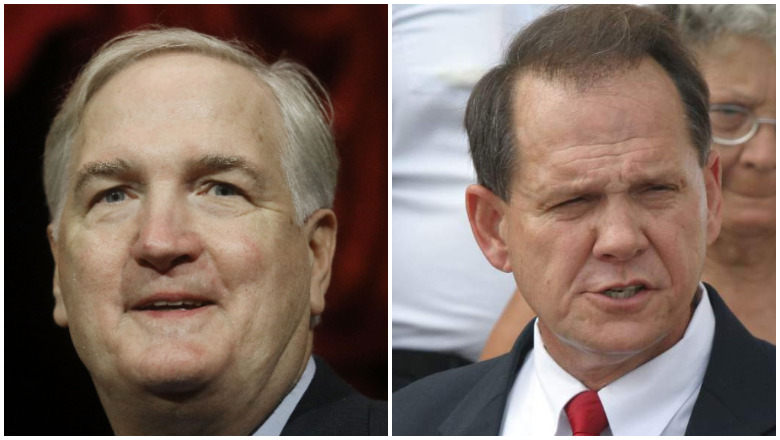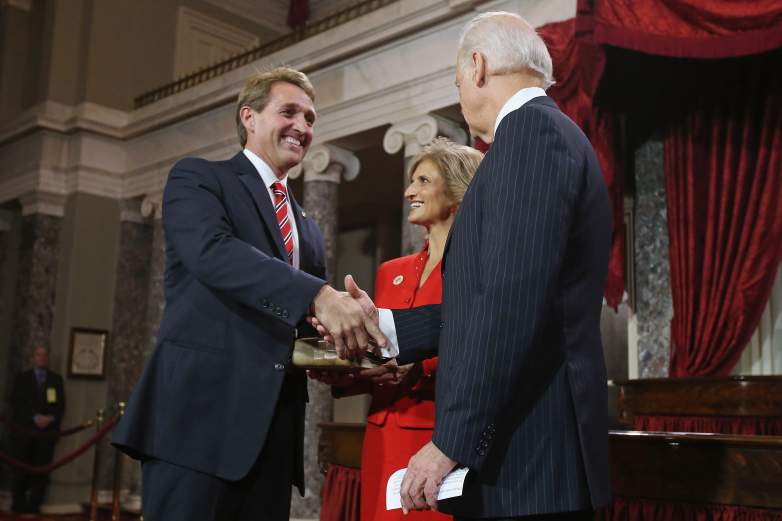
Alabama will hold a special election for U.S. Senate on December 12 to fill the seat vacated by Attorney General Jeff Sessions earlier this year. Senator Luther Strange, who was appointed by former Alabama Governor Robert Bentley, currently holds the post.
The special election has perhaps been a reflection of the air of convolutedness surrounding the political climate this year. Establishment candidates have lost elections despite significant backing from national political figures, including the president. Allegations of sexual misconduct have been levied against Roy Moore, who has been asked to step down by a number of his fellow Republicans. The polls have yo-yoed and national Democrats are starting wonder if they actually have a shot at winning a Senate seat in the deeply red state.
Here’s what you need to know about the Alabama special election:
1. Senate-backed Republican Luther Strange lost the party nomination to controversial former judge Roy Moore

GettyLuther Strange (l) and Roy Moore (r).
Incumbent Senator Luther Strange was the favorite heading into the Republican primary election in August. Formerly the state’s attorney general before Governor Robert Bentley appointed Strange to replace Attorney General Jeff Sessions until a special election could be held to fill his seat.
Bentley resigned from office later that month in the culmination of a months-long ethics investigation stemming from an extramarital affair with a top aide, tainting Strange’s appointment in some eyes.
Strange won endorsements from President Trump, Vice President Mike Pence and Senate Majority Leader Mitch McConnell, but pundits speculated that the senator’s support from establishment Republicans hurt the candidate rather than helped him with the deeply conservative electorate. Polls hinted at a tight race between Strange and his opponent, Roy Moore, a former Alabama Supreme Court justice who had twice been removed from the court over religious divides.
In the primary election, Strange came in six points below Moore in a 32-38 split. As neither won an outright majority, the two advanced to a runoff primary election in September, where Moore triumphed over Strange by a 10-point margin.
Following the win, media outlets reported that Trump had deleted his tweets endorsing Strange shortly before tweeting his congratulations (but not an official endorsement) to Moore. According to Politico, Trump had made the endorsement begrudgingly, complaining to advisors that his base supported Moore over Strange, and that he worried he would alienate his supporters in Alabama, where, he said, “they love me.”
Trump officially endorsed Moore in December.
2. Some of Moore’s fellow Republicans have called for him to drop out of the race following allegations of sexual misconduct with underaged girls

Facebook, Kayla MooreRoy and Kayla Moore with their grandchildren.
In November 2017, The Washington Post published a story alleging that Moore had made sexual advances toward Alabamian Leigh Corfman when she was 14-years-old and Moore a 32-year-old prosecutor.
Corfman told The Washington Post that Moore initially approached her outside of a courtroom in Etowah County, Alabama, then asked for her phone number. Moore allegedly picked Corfman up from her home a few days later for a date. On their second date, Corfman says that Moore took her hand and placed it on his genitals over his pants.
Since The Post broke its story about Corfman’s allegations, eight other women have come forward with similar complaints. The most serious of which alleges that Moore attempted to force a 16-year-old Beverly Young Nelson to perform oral sex on him in his car after Moore offered to give her a ride home from the restaurant where she worked.
A number of high profile officials have since called for Moore, who has denied all allegations, to step down from the race—including some high-profile fellow Republicans, like Senate Majority Leader Mitch McConnell and Senators John McCain, Susan Collins and Lindsay Graham. Additionally, other politicians like Ted Cruz and John Cornyn have revoked their endorsements of Moore’s candidacy.
3. Moore has slipped significantly in the polls since the allegations were made against him

WikipediaDoug Jones
After winning the primary runoff election in September, Moore initially held a very strong lead in the polls over Democratic opponent Doug Jones. In September and October, Jones trailed in every poll by at least four percent with the exception of one, in which the two candidates tied.
After news broke of the allegations of sexual misconduct surround Moore, polls slowly started to shift in favor of Jones. Of the last 17 polls conducted since November, Jones has bested or tied with Moore in eight—a staggering feat in a state that went to Trump in 2016’s presidential election by a whopping 28 percent.
According to a polling average by RealClearPolitics, Jones currently leads Moore by less than a percentage point.
4. The special election could potentially thin the GOP’s slim Senate majority & serve as a barometer for the 2018 elections

Photo by Chip Somodevilla/Getty ImagesWASHINGTON, DC – OCTOBER 24: Senate Majority Leader Mitch McConnell (R-KY) (L) and U.S. President Donald Trump arrive for the Republican Senate Policy Luncheon at the U.S. Capitol.
Alabama’s Senate race is the first election for federal office since Trump won the presidency last year. On the heels of his historic campaign, many have looked to the smattering of elections in 2017 for clues as to what the future might hold for both parties. Namely, can Democrats capitalize on a mid-term election advantage and win back the Senate in 2018?
According to the politics team at FiveThirtyEight, it is a real possibility—especially if Doug Jones beats Roy Moore on December 12. Because so many Democratic senators are up for re-election next year compared to so few Republicans, Democrats already have few opportunities to pick up seats mid-term, making the Alabama race even more critical to gaining a majority.
While getting a Democrat elected in Alabama might seem like an impossible feat, in reality it is not so far fetched. Though Republicans have dominated Alabama’s Congressional delegation for the past few decades, prior to the election of Jeremiah Denton, Jr. in 1981, Alabama had not had a Republican senator in the Senate since 1879. The last Democratic senator from Alabama left Washington in 1997, just 20 years ago.
Moreover, the unexpectedly competitive race in Alabama has national Democrats wondering if this special election could afford them a rare odd-year opportunity to slim down the opposition’s majority. Republicans have had a 52-48 majority since the 2016 elections, and dissent from GOP senators has already killed a number of pivotal bills. A one-seat majority for Republicans would mean that frequent mavericks like John McCain and Rand Paul could stop legislation without any help from their colleagues.
5. The election will take place on December 12 & winner will not likely be sworn in until January

GettyU.S. Sen. Jeff Flake (R-AZ), left, participates in a reenacted swearing-in with his wife Cheryl Flake, center, and U.S. Vice President Joe Biden in the Old Senate Chamber at the U.S. Capitol January 3, 2013 in Washington, DC.
Alabama voters head to the polls on December 12. Once the election results are certified, the winner can be sworn in during the next open Senate session. The deadline for Alabama counties to report official election results is December 22, which means final results are not likely to be certified until after Christmas.
Since the Senate is in recess during the last week of December, the winner of the election is unlikely to be sworn in before they reconvene in January.